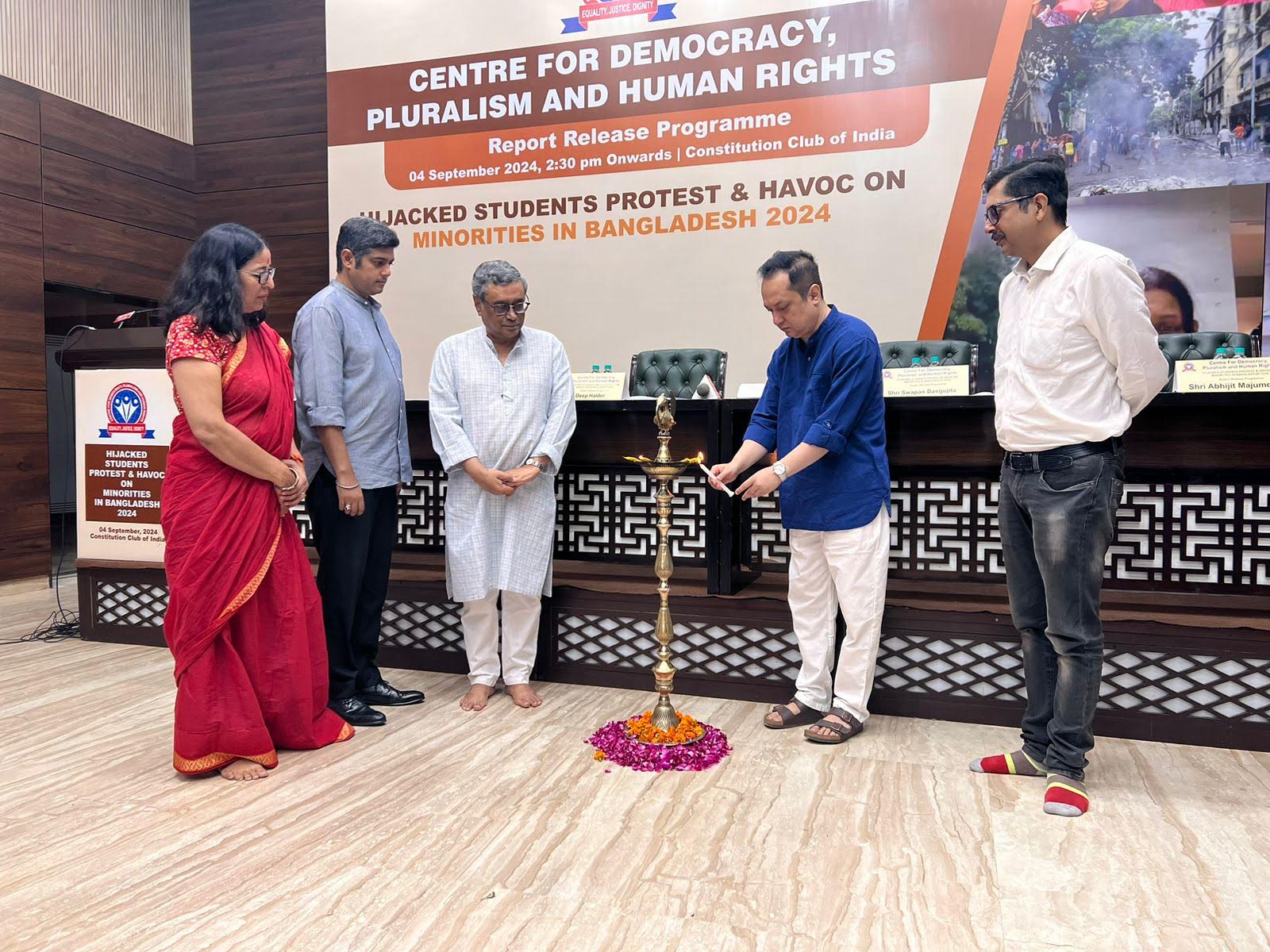The report was released on September 4, 2024, at the Constitution Club of India in Delhi. The event saw a substantial turnout of [number] attendees and featured distinguished speakers, including:
-Chief Guest, Shri Swapan Dasgupta, Former Member of Parliament and Renowned Journalist
-Guest of honour, Shri Abhijit Majumder, Prominent Journalist and Author
-Guest of honour, Shri Deep Halder, Author of *Being Hindu in Bangladesh* and Journalist
Highlights of the Report
The report focuses specifically on the ongoing political unrest in the country following the start of months-long protests on June 5, 2024, concerning the quota issue. The deliberate targeting of religious minorities and the emergence of mob rule on the streets are extremely alarming. This report documents and analyzes the attacks against minorities in Bangladesh as the country descended into chaos after Prime Minister Sheikh Hasina was forced to flee. The data has been collected with assistance from human rights activists in Bangladesh, local and international news reports, and Bangladeshi minority organizations. CDPHR has diligently verified the data of the attacks district-wise with the help of local sources.
Student-led protest
These protests began as genuine student-led protests with initially non-political demands. There was genuine anger against the sudden increase in quotas for government jobs reserved for the dependents of freedom fighters. As the protests spread, several civil society groups, Islamist/right-wing opposition parties such as Jamaat-e-Islami and the Bangladesh Nationalist Party (BNP), and other radical parties joined in. Consequently, the goals of the protesters became more political as the movement progressed. There was also increased involvement of American envoys and diplomats in the country during and before these protests. The report reveals that American diplomats have been meeting with opposition leaders, NGOs, and Islamist groups for the past few years. Throughout this period, there is a long public record of the Hasina regime’s constant displeasure. The protests eventually became a tool for regime change as student groups finally demanded only one thing: Sheikh Hasina’s resignation.
Major Findings
From Regime Change to Systemic Attacks Against the Minorities
After Hasina fled the country, systematic and widespread attacks against the Hindus began. The lack of order paved the way for a mobocracy in the country wherein a frenzied and hysterical persecution of the religious minorities and Awami League members began. Historically, minorities (Buddhists,Christians,Jains) especially Hindus have always been the punching bag of the extremists and Islamists whenever there is any political, social or religious unrest. This time it was no different. On Monday 5th August, there were confirmed reports of attacks and lootings against minority homes and businesses in at least 27 districts. By Friday according to the minority organization the Bangladesh Hindu Buddhist Christian Unity Council, 52 districts witnessed 205 anti-Hindu attacks. On the 28th the Bangladesh Chhatra Oikya Parishad reported that at least 49 teachers have been forced to resign from their jobs. CDPHR has provided complete details of 110 cases of atrocities against minority Hindus between the 5th to 9th of August 2024.
Information Warfare, Denial of Truth and Clash over Narratives
The internationalisation of these atrocities started an orchestrated campaign to deny these attacks or doubt the religious nature of these attacks. The General Secretary of BNP led this campaign when he told an Indian news channel that these were individual incidents, not “systematic” and started by stray individuals. One can see that the narrative buildup started during this phase with the BNP leading this campaign of denial of systemic abuse of Hindus in the country.
Local Bangladeshi actors were aided by the global media in this campaign of denial and obfuscation. Qatar’s mouthpiece Al Jazeera even termed the attempts to highlight atrocities as ‘Islamophobic’ and “Alarmist”. In a country where Hindus have faced unprecedented pogroms over any random pretext, such attempts were meant to divert the attention away from this atrocity. However, brave Bangladeshi minority activists themselves reported the widespread nature of these protests. CDPHR has collaborated with some activists and confirmed the extent of such attacks as the only Indian Human Rights organisation. Furthermore, there are documented cases of attacks against Ahmaddiyas too. The role of global media should be to bring out these facts and give a voice to religious minorities. Instead, some are more interested in winning a narrative war with Indian social media trolls who spread half-baked misinformation. More importantly, most of the Bangladeshi individuals spreading this narrative belong to the majority Bangladeshi community who are pro-interim government. Who appointed them to speak on behalf of the minority Hindus? One such individual, the senior editor of Dhaka Tribune, was allowed to spread his narrative that “Hindus are not in danger” and that the minorities in Bangladesh are safer than India. This was propagated by both Indian and global media. Ironically, just a few days after, a report emerged that there is a systematic campaign in the country wherein Hindu government teachers are being forced to resign.
Western media, despite claiming to champion human rights, often ignored or misrepresented the violence against Hindus in Bangladesh. Outlets like France24 dismissed these hate crimes, framing them in a geopolitical context and accusing India of “hypocrisy.” Articles from The Print and other liberal-left Indian media tried to portray the attacks as politically motivated rather than religious, creating a misleading dichotomy. This report addresses that narrative by using data from the ground and historical data to prove that nothing about these attacks against the country is random. Attacking the lives, businesses, property, religious places and now jobs of a vulnerable minority is not random. The media’s responsibility lies in reporting the truth and instead of taking self-appointed, pro-regime/protest individuals at face value, listen to minority activists and NGOs who report on the issue.
Interim Government and Its Islamist Bedfellows: Future of Religious Minority in Bangladesh
The whole worldview of Islamist parties in Bangladesh is about the strict distinction between Kafirs and Muslims. The religious minorities of Bangladesh historically have been a victim of the Kafir, two-nation and hostage population theories. This latest round is nothing but a continuation of the project that began with the Pakistan formation: the creation of two nations with minorities held hostage in the Muslim majority province. Hindu bodies and society have been a site for contestation ever since. Hindus come under attack whenever there is unrest in the country or the neighbouring India. A decade ago, Bangladeshi scholar Abdul Barkat calculated that within 30 years there won’t be any Hindus left in the country. Sadly, the way this interim government is pandering to the Islamists by releasing terrorists from Ansarullah and hastily removing the ban against the anti-minority Jamaat is concerning. The future of minorities looks quite bleak. From 1951 to 2022 the percentage of Hindus has reduced from 22 percent to 8 percent in the country.
American Deep State and Regime Change
The involvement of the US deep state in this crisis is a complex issue. There is ample evidence of regular meetings between the envoys, diplomats and feelers from the Department of State and the US Embassy in Dhaka. Furthermore, the regime of Sheikh Hasina constantly resented publicly the meetings between these American operatives, opposition leaders including Islamist groups and civil society activists. Munhammad Yunus is a well know element among these civil society groups that were part of such meetings. This constant nurturing of such elements is a well documented pattern of American covert diplomacy and interventions in foreign countries. The American support for the anti Hasina forces has continued even after the installment of Yunus as Head of the new interim government.
Speakers provided insights into the current unrest and the conditions faced by the Hindu community in Bangladesh.
-Shri Swapan Dasgupta, Former Member of Parliament and Renowned Journalist Swapan Dasgupta described the rapid escalation of violence against Hindus in Bangladesh that occurred just two days after Sheikh Hasina’s departure, despite claims of the unrest being spontaneous. This violence targeted Hindus specifically, a fact even acknowledged by the Prime Minister of India. He also emphasized that organizations like ISKCON and Bharat Sewa Sansad are acting as vital protectors for the Hindu community. He highlighted several critical issues concerning the situation of Bangladeshi Hindus. To safeguard their future, he suggested that Bangladeshi families should send at least one member abroad as a form of “insurance”. He criticized the systemic discrepancies where Hindus often enter India without proper documentation, while Jamaat members, Muslims, and Rohingyas enter with voter cards and Aadhar cards. He also pointed out that Bangladesh’s policy seems to involve offloading its population burden onto India, with groups like Khalida Zia’s supporters, who are known for their anti-India sentiment, exacerbating the situation. He urged India to send a clear message that it remains open to Bangladeshi Hindus, affirming their status as part of the broader Indian family and recognizing the need to support and safeguard them in the face of such persecution.

– Shri Abhijit Majumder, Prominent Journalist and Author addressed the attendees by highlighting a troubling surge in anti-Hindu and anti-Buddhist attacks, noting that there were 205 such incidents in just one week. He reveals a disturbing trend of about 450 attacks per year over the past eight years. This rise in violence points to a significant failure on the part of the Bharat government and Hindu society in effectively addressing the situation in Bangladesh, largely due to an over-reliance on Sheikh Hasina and a lack of consideration for alternative approaches. He also questioned why there had been no strategic exploration of a third front over the years, contrasting this with Bharat’s successful diplomatic engagement in Afghanistan, where dialogues even included the Taliban. He criticized the miscalculation in Bangladesh, attributing it to a narrow perspective rooted in the context of 1971, he added that to effectively address rising violence and ensure better protection for Hindus and Buddhists, Hindu organizations need to mobilize street power by rallying people and funds. Simultaneously, treat Bangladesh as an Islamic country and try to open channels with all stakeholders, including smaller neighbors but not solely relying on the façade of peace and remaining vigilant to prevent future harms.
-Shri Deep Halder, author of “Being Hindu in Bangladesh” and a journalist, stated in his speech that The situation of “Islamo-trauma” is currently occurring in Bangladesh, exemplified by the prosecution of minorities during Sheikh Hasina’s tenure, which has been a persistent concern. This situation is compounded by the influence of madrassas that propagate hatred among the youth, exacerbating communal tensions. For the first time, global media had to address the plight of Hindus, highlighting the severe discrimination they faced. Efforts to obscure these realities included the forced resignation of Hindus from their jobs, which was attempted to be masked by creating misleading narratives, the protections once afforded to Hindus by Sheikh Hasina’s government are now gone. Even during her tenure, Hindus faced persistent attacks. Today, these communities find themselves with little support and few avenues for assistance. While Md. Yunus may make optimistic statements, the harsh realities on the ground paint a different picture. It is crucial for the global community to maintain its focus on the plight of the Hindu minority in Bangladesh and not turn a blind eye to their ongoing struggles.
-Dr. Prerna Malhotra, President, CDPHR addressed the attendees, highlighting the escalating Islamization in Bangladesh, likening the situation to sitting atop a volcano poised to erupt at any moment. This volatility poses a grave threat to the country’s minority communities, particularly Hindus. The troubling developments of recent decades have already had significant repercussions, and the current trajectory suggests a worsening future for Hindus in Bangladesh. Without decisive intervention from international organizations, governments, and societal leaders, there is a serious risk that the Hindu population could face extinction.
The illegitimate government has not shown any improvement in the conditions of minorities over the past 3 weeks. The government has failed to maintain law and order and protect the rights of minorities.
The trajectory of ‘new’ Bangladesh looks very dark for the religious and ethnic minorities in the country. Already, the Hindus of the country have been depleted steeply in the last few decades and the reasons could be out of the three- got killed, converted or fled. What further awaits them is too gloomy. The only ray of hope is the unity shown by Bangladesh minorities in coming out for their human rights.
The government of Bangladesh cannot derelict its moral and constitutional duty to protect the minoritics. By pandering to extremists and Islamists they are endangering their future in the
country.
India share a responsibility to protect the minorities in Bangladesh and ensure that they survive and flourish in their country. India has a civilisational responsibility towards these minorities, they need India’s complete diplomatic, political, economic and legal protection. In such a dark, insecure and uncertain environment India, that is Bharat, should effectively play its predestined role as a dharmic civilisational state that protects the persecuted minorities in this neighbourhood.





